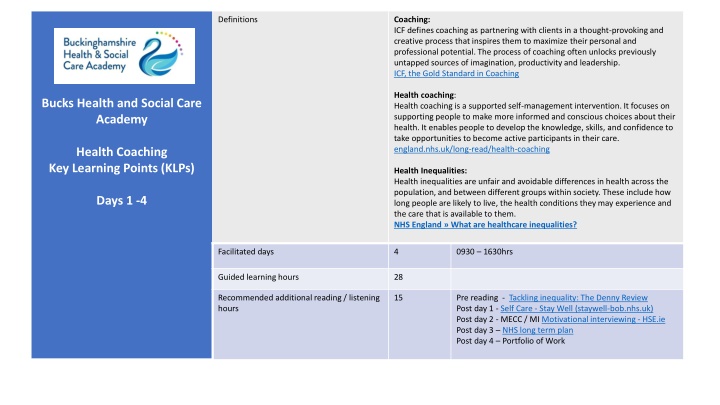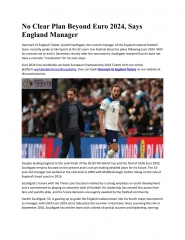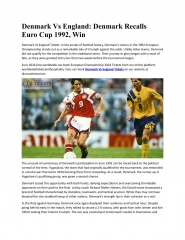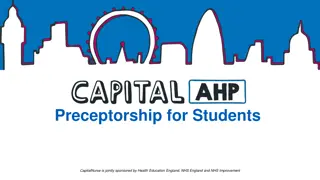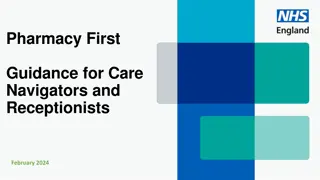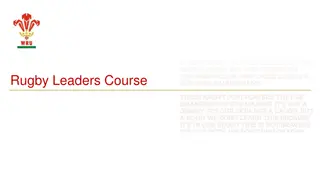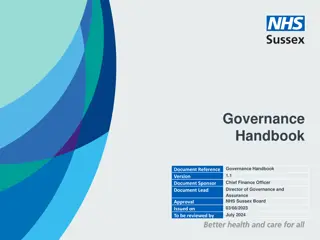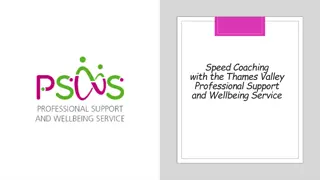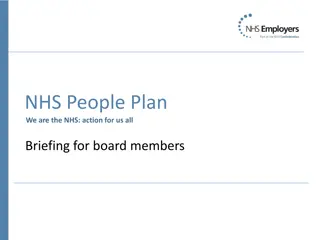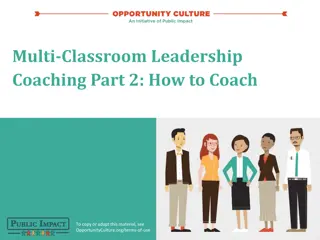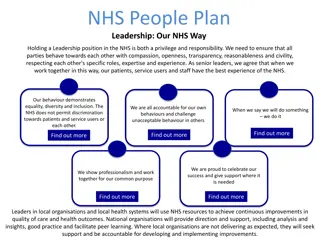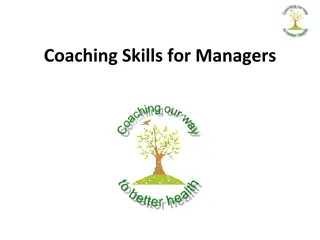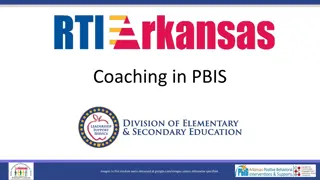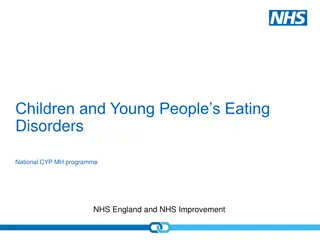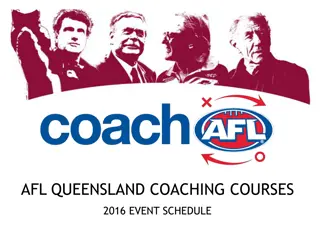Overview of Coaching and Health Coaching in NHS England
ICF defines coaching as a thought-provoking process maximizing personal potential. Health coaching focuses on self-management and informed health choices for individuals. Learn key principles, practices, and models in health coaching addressing health inequalities and enhancing personalized care in the NHS England context.
Download Presentation

Please find below an Image/Link to download the presentation.
The content on the website is provided AS IS for your information and personal use only. It may not be sold, licensed, or shared on other websites without obtaining consent from the author.If you encounter any issues during the download, it is possible that the publisher has removed the file from their server.
You are allowed to download the files provided on this website for personal or commercial use, subject to the condition that they are used lawfully. All files are the property of their respective owners.
The content on the website is provided AS IS for your information and personal use only. It may not be sold, licensed, or shared on other websites without obtaining consent from the author.
E N D
Presentation Transcript
Definitions Coaching: ICF defines coaching as partnering with clients in a thought-provoking and creative process that inspires them to maximize their personal and professional potential. The process of coaching often unlocks previously untapped sources of imagination, productivity and leadership. ICF, the Gold Standard in Coaching Health coaching: Health coaching is a supported self-management intervention. It focuses on supporting people to make more informed and conscious choices about their health. It enables people to develop the knowledge, skills, and confidence to take opportunities to become active participants in their care. england.nhs.uk/long-read/health-coaching Bucks Health and Social Care Academy Health Coaching Key Learning Points (KLPs) Health Inequalities: Health inequalities are unfair and avoidable differences in health across the population, and between different groups within society. These include how long people are likely to live, the health conditions they may experience and the care that is available to them. NHS England What are healthcare inequalities? Days 1 -4 Facilitated days 4 0930 1630hrs Guided learning hours 28 Recommended additional reading / listening hours 15 Pre reading - Tackling inequality: The Denny Review Post day 1 - Self Care - Stay Well (staywell-bob.nhs.uk) Post day 2 - MECC / MI Motivational interviewing - HSE.ie Post day 3 NHS long term plan Post day 4 Portfolio of Work
Learning Outcomes (Day 1) Key Learning Points PCI Curriculum (Slide 6) 1 Introduction to the Universal model of personalised care, health inequalities and health coaching 1.1 Know the Universal Model of personalised care 001 1.2 Know the impact that a range of social, economic and environmental factors can have on outcomes for individuals 002 1.3 Know the principles and concepts of health coaching 003 1.4 Be aware of the key relevant and current policies around personalised approaches 004 2 2.1 Understand ones self and others learning styles, using Fleming s Visual, Auditory and Kinaesthetic (VAK) model. 005 / 007 Understand how people learn and think. 2.2 Discuss Kolb s Experiential learning cycle to prevent the coach only using their preferred style. 005 / 007 3 3.1 Learn the definition of health coaching and the difference between health coaching, mentoring, counselling and advisory services. 013 / 033 Understand a coaching mindset and the importance of creating a safe and positive relationship to support engagement and building of rapport. 3.2 Learn characteristics of a coaching mindset versus fixed mindset and practice applying a coaching mindset to maximise the effectiveness of conversations. 005 / 015 4 4.1 Learn and practice the TGROW coaching model 008 / 034 Know how to structure conversations using a coaching approach and have the opportunity to practice using a model within a safe and supportive environment. 4.2 Understand different types of questions and be able to use effective questions to raise awareness and provide supportive change 009
Learning Outcomes (Day 2) Key Learning Points PCI Curriculum (Slide 6) 5 Coaching skills continued including: 5.1 Learn effective questioning and listening techniques to identify barriers to change (said and unsaid) 020 Understand the importance of key communication skills including active and empathetic listening whilst building trust and rapport, and understanding the need for sensitivity and confidentiality. 5.2 Learn key communication skills to be able to work with resistance in a non judgemental way (TA) 010 / 013 5.3 Be able to build safety in the conversation to support openness and honesty and willingness to engage. Trust and Rapport 011 / 012 5.4 Understand the importance of confidentiality and when confidentiality may need to be broken and why. 006 /007 6 Support to service users to set goals that encourage intrinsic motivation and are responsive and sensitive to the needs and beliefs of the service user. 6.1 Learn SMART goal setting model 014 / 015 6.2 Understand that each person is an expert in their own life and the importance of mindset and motivations ( I want to vs I have to motivation) 015 7 Appropriate use of problem solving and goal follow-up across sessions to maintain and increase activation 7.1 Practice TGROW and SMART in a safe environment including feedback from fellow delegates and trainer 016 / 034
Learning Outcomes (Day 3) Key Learning Points PCI Curriculum (slide 6) 8 Reflections and learning from self-directed study 8.1 Share key points and outcomes from self-directed study 017 - 021 / 026 9 Supporting behaviour change 9.1 Introduce and understand MECC, COM-B, and 3A s, as an example of a behaviour change technique and then practice using it in a health context scenario. 018 / 019 / 023 / 026 / 027 /034 9.2 Discuss asset based approach and what is strong versus what is wrong attitude to support behaviour change 019 10 Motivational Interviewing 10.1 Know the ethos and principles of MI and discuss the benefits of using MI for HCP and service users 021 10.2 Know the Stages of Change Model by Prochalska and Di Cleente s and how to apply in practice 022 / 023 10.3 Understand maintenance and change talk in motivational interviewing 024 10.4 Learn and practice OARS Model and 4 stages of MI to be able to work with individuals who express resistance to change 025 10.5 Understand and be able to use the Decisional Imbalance Tool 010 / 029
Learning Outcomes (Day 4) Key Learning Points PCI Curriculum (slide 6) 12 Change management tools 12.1 Know the different elements of the change curve. 015 / 016 / 018 12.2 Be able to explain the stages of transition during a change. 011 / 012 / 014 / 022 / 023 12.3 Be able to list different types of barriers to change (cognitive, emotional, behavioural, physical etc) 010 13 Stress management and the importance of looking after ourselves 13.1 Discuss what stress is and it s side effects 007 / 009 / 014 / 015 13.2 Reflect on Stress curve and stress container and it s application 028 13.3 Learn and apply SPACER model 028 14 Be able to apply a range of health coaching models, frames and techniques that support self management. 14.1 Practice coaching session with other delegates in a safe environment with feedback 029 / 030 15 The importance of a community of practice peer support and supervision 15.1 Introduction to reflective conversation model 031 15.2 Buddy buddy system Invitation to community of practice 032
CPI Curriculum Ser No Curriculum 001 Know the Universal Model of personalised care 002 Know the impact that a range of social, economic and environmental factors can have on outcomes for individuals 003 Know the principles and concepts of health coaching 004 Be aware of the key relevant and current policies around personalised approaches 005 Be able to apply a coaching mind-set to maximise the effectiveness of conversations 006 Be able to build safety in the conversation to support openness and honesty and willingness to engage 007 The importance of engaging and building rapport
Ser No Curriculum 008 Know how to structure conversations using a coaching approach 009 Be able to use effective questions to raise awareness and provide supportive challenge 010 Understand health behaviour barriers to change (cognitive, emotional, behavioural etc) 011 Be able to work constructively with resistance in non- judgemental way 012 Develop rapport and engagement to explore areas of change 013 Be able to apply a range of directive and non-directive communication approaches 014 Be able to support the person to set goals which encourage intrinsic motivation and achieve outcomes that are important to them 015 Understand that each person is an expert in their own life and the importance of mindset and motivation 016 Be able to use action planning and goal setting models including breaking goals into achievable chunks and identifying opportunities for follow-up 017 Be aware of the relevant resources available to support behaviour change including COM B, MECC, Motivational Interviewing and health coaching 018 Be able to identify when to use behaviour change techniques 019 Understand an individuals level of knowledge, skills and confidence in the context of them as a whole person, using an asset based approach 020 Be able to confidently demonstrate the core communication skills for relationship building and information gathering 021 Know the ethos and principles of motivational interviewing
Ser No Curriculum 022 Know the cycle of change and how to apply it 023 Understand how to identify readiness to engage in positive behaviour change 024 Understand maintenance and change talk in motivational interviewing 025 Be able to recognise and work with individuals who express resistance and ambivalence to change 026 Understand What MECC is and who it is for 027 Know brief intervention and behaviour change skills 028 Be able to support people to self reflect and understand the relationships and connections between their emotions, feelings and behaviours 029 Be able to utilise the appropriate specific coaching and behaviour change techniques in a variety of circumstances 030 Be able to apply health coaching approaches to a wide range of situations on a consistent basis 031 Further develop their facilitation skills and encourage a community of practice 032 Be able to gain meaningful feedback from service users 033 The difference between executive and performance coaching and the tension this creates when balancing changes to importance to the person and the changes of importance to the workforce or system 034 Convey expertise, ideas and challenge to support individuals while leaving them in control
